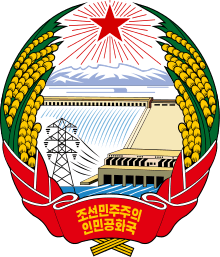Judiciary of North Korea
 |
| This article is part of a series on the politics and government of North Korea |
|
|
| Foreign relations |
In the Democratic People's Republic of Korea (DPRK or North Korea), the Central Court is the highest court, with its judges appointed by the Supreme People's Assembly. According to the Constitution of North Korea, the Central Court is accountable to the Supreme People's Assembly, and the Criminal Code subjects judges to criminal liability for handing down "unjust judgments".
Central Court of North Korea
Highest court and court of Appeal in North Korea.
The court is headed by a Chief Judge or President, two Associate Chief Judges/Vice Presidents and unknown number of regular Justices.[1]
The court's home was completed in 2010[2]
Former Chief Judges and Associate Judges
- Pang Hak Se 1972-1992; Chief Judge
- Kim Pyong Ryul 1998-2012; died 2013[3]
- Choe Yong-song - Associate Judge
- Hyon Hong-sam - Associate Judge
Lower Courts of North Korea
Below the high court are two other judicial levels:[4]
- Provincial Court or Court of the Province - 9 courts
- People's Courts or Court of the County
Judicial independence
Article 157 of the Constitution states that "cases are heard in public, and the accused is guaranteed the right to a defense; hearings may be closed to the public as stipulated by law".~~~ The lack of judicial independence is also evidenced by Article 11 of the Prosecution Supervisory Law that stipulates “The prosecutor(s) shall supervise whether the trial or arbitration of a case is accurately deliberating and resolving the legal requirements and in a timely manner.”[5]
Organization
The Constitution states that justice is administered by the Central Court, Provincial or special-city level courts, the People’s Court or Special Courts, and the courts are accountable to the Supreme People’s Assembly or when it is not in session, its Presidium.[6]
References
- ↑ http://www.country-data.com/cgi-bin/query/r-9648.html
- ↑ https://nkleadershipwatch.wordpress.com/2010/01/25/new-dprk-central-court/
- ↑ https://nkleadershipwatch.wordpress.com/2013/11/06/former-dprk-courts-boss-kim-pyong-ryul-dies/
- ↑ http://www.country-data.com/cgi-bin/query/r-9648.html
- ↑ Korea Institute for National Unification, 2011 White Paper on Human Rights in North Korea, pg. 180-81.
- ↑ Article 162 of the North Korean Constitution